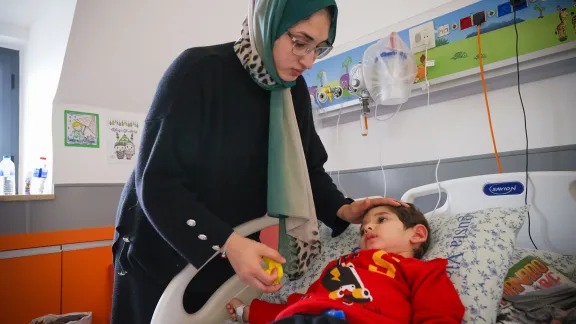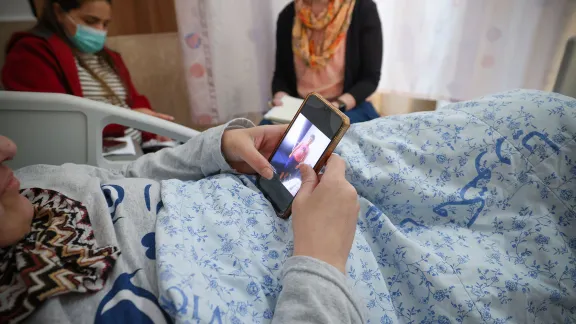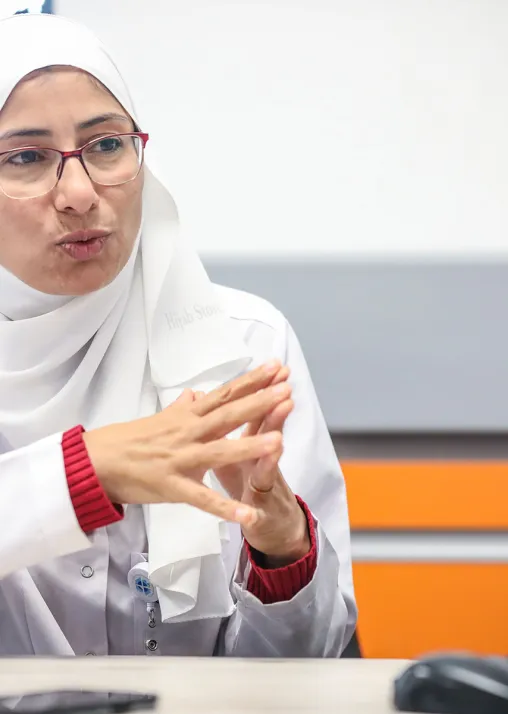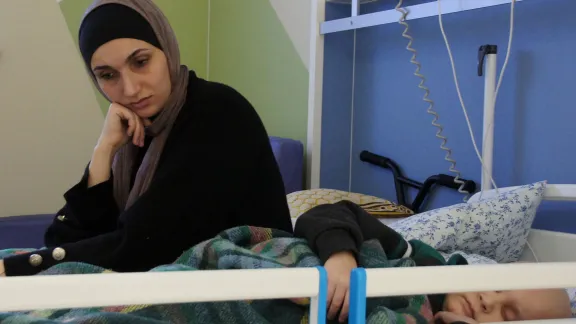Cancer patients from Gaza constantly face two challenges: a life-threatening disease and fear for their loved ones back home. LWI spoke to some of the patients during a visit to the Augusta Victoria Hospital

"Ahmed” and his mother. The family has been divided by the war, the young woman fears for the lives of her family. Photo: LWF/ Atta Jabr
Augusta Victoria-Hospital staff work hard to provide medical and mental support
LWI) - There were 96 patients and companions from Gaza at the Augusta Victoria Hospital (AVH) in East Jerusalem when Israel started bombing the Gaza Strip. The patients and their companions have been living in the hospital compound for almost seven months, and receiving news that their homes have been destroyed and family members killed. On a recent visit to the hospital, Lutheran World Information (LWI) learned about their stories and how the situation impacts their treatment.
"When the war started, I wanted to stop my therapy and go back home," says Nour (names of patients and companions changed). The young woman came for a complex surgery and treatment of a brain tumor, leaving her husband, son, and three daughters in Gaza. Her family convinced her to stay at the hospital. They did not expect to be separated for such a long time.
Afraid to hope
Nour learned on the phone that their home was destroyed, and the family had been evacuated to Rafah, where they are now living in a tent. Her youngest daughter is four years old. Despite their situation, the family tries to support her. "My children say: We have seen how sick you were; it is good that you are at the hospital. But when your treatment is done, please, please come back to us!" she says with tears in her eyes.

Nour tries to contact her family on the phone. Photo: LWF/ Atta Jabr
"We are trying not to lose hope," says Bisan Kheir, Director of Resources Development at the AVH. Since the war started, the hospital management and staff organized accommodation, winter and summer clothes, hygiene kits, and sometimes creative activities for patients from Gaza now stranded at the hospital.
For patients and their companions, life now happens entirely on the hospital campus. "I was supposed to return home in early December," says Leyla. Her four-year-old son Ahmed is receiving radiation treatment for a brain tumor. Still in the Gaza Strip are Leyla's husband and two younger children, one and three years old. The youngest was a baby of six months when Leyla left.
Leyla's father and two brothers were killed; their home was bombed. Her children now live in a tent in Rafah, complaining of hunger and cold. "I am afraid, even afraid to hope," the young woman says. "But I have to be strong for the family and for Ahmed."
Ahmed's treatment is palliative. "Receiving such a diagnosis is a shock for the parents," says Dr Khadra Salami, Pediatric Oncologist. Therapy for child cancer patients usually involves counseling for the entire family, especially if the prognosis is poor. Currently, the team can only work with the mother, who has been alone and without family support for seven months. They try to counsel the father and grandmother on the phone.
No more contact
Two-thirds of the 100 child cancer patients who receive treatment at AVH every year come from the Gaza , says Dr Salami. Every year, 400 children are diagnosed with cancer in Gaza and the West Bank; there should have been about 50 new patients by now. However, since October 2023, only the few who were already in the hospital received treatment. "We have a special relationship with our patients," the doctor explains. "But now we have lost contact with most of them. Many have died in the war. When we receive news these days, it's usually bad news. "The past months have been tough, she adds.
When we receive news these days, it's usually bad news.
Dr. Khadra SALAMI, pediatric oncologist at the Augusta-Victoria Hospital
A few rooms down the corridor, Samar has finished her prayers. Her eight-year-old son Khalid is being treated for leukemia and struggles with the side effects of chemotherapy. "The doctors make me look ugly," he says, trying to refuse even a blood pressure exam. The eight-year-old has lost his hair; his face is swollen. His mother has crafted Ramadan paper lanterns with him and organized a wig, but when she tries to cheer him up, the smile does not reach her eyes.

Dr Khadra Salami. Photo: LWF/ Atta Jabr
Samar's husband and three younger children are in Northern Gaza. Their house has been destroyed; they tell her there is no food. Samar's youngest daughter recently said "Mama," referring to her sister, who has been caring for the two-year-old. Samar's other daughter refuses to talk to her. "There is no hygiene, no water, my daughter has lice… it's driving me crazy," Samar says helplessly. The children in Gaza envy Khalid, who is with their mother. At the same time, the sick boy longs for his family. Khalid is perceptive; he knows about the war.

Samar and Khalid. The mother shows the image of one of her younger children, that are still in Gaza. Photo: LWF/ C. Kästner-Meyer
Risk of deportation
In late March, the Israeli administration asked the hospitals in East Jerusalem to provide a list of patients who had completed treatment to deport them back to the Gaza Strip. Together with civil society organizations, the East Jerusalem Hospital Network got an injunction from the court to stop the procedure. Not only has the health care in Gaza broken down to a point where not even paracetamol is available, but many Gaza patients at AVH no longer have a home to return to. Children like Ahmed need special food, medication, physiotherapy, and a clean environment. "I could not send these children to a tent," Dr Salami says.
The stress on nurses and doctors is great, notes Dr Amal Abu Awad, AVH chief nursing officer. For many, the stress continues at home, she said, because of settler violence, partners who have lost their jobs, or restrictions to visiting even close family in neighboring villages. The hospital offers counseling and support groups to both patients and staff.
"It gives us strength to help our patients," Awad simply says.


